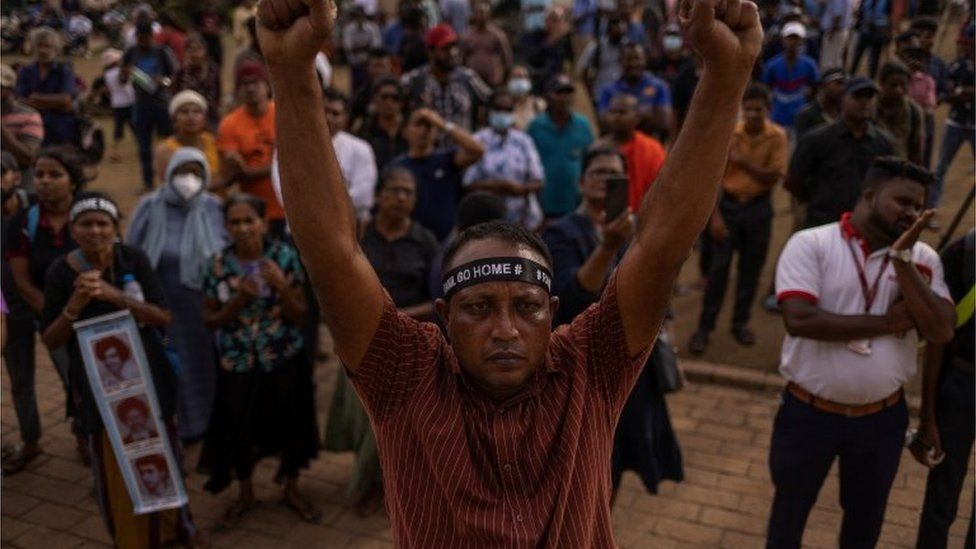Sri Lanka’s Ranil Wickremesinghe has been sworn in as president, with hopes that he will help the country’s economy.
On Thursday, the 73-year-old took his oath of office at the heavily guarded parliament complex.
Mr Wickremesinghe, the former prime minister, is widely despised by the public, but some protesters have stated that they will give him a chance.
An economic crisis has caused months of unrest in Sri Lanka.
Many people blame the Rajapaksa administration for mismanaging the country’s finances, and Mr Wickremesinghe is seen as part of the problem. However, there were few protests on the streets the day after Mr Wickremesinghe was elected to parliament.
“He’s arrived, and we’ll see what he does.” If we do not receive food, any medicine, we’ll be on the streets,” one woman who had joined protests last week told the BBC.
Mr Wickremesinghe – who won a majority among lawmakers with the backing of the Rajapaksa’s ruling party, the Sri Lanka’s People’s Front (SLPP) – took pains to distance himself from the old leaders.
“I am not a friend of the Rajapaksas.” “I am a friend of the people,” he told reporters on Wednesday after defeating his main rival-a dissident SLPP MP-by 134 votes to 82.
On Thursday, the opposition signalled they would be willing to work with Mr Wickremesinghe. Local media is reporting that his cabinet is likely to include opposition MPs.
However, many protesters have expressed despair and disappointment over a Rajapaksa-allied politician’s victory.
“I am absolutely disgusted at the result… I cannot believe that 134 people – MPs that are supposed to represent the people – have completely disregarded the wants of the people,” activist Jeana De Zoysa told the BBC.
Fears of protest crackdown
by Anbarasan Ethirajan, BBC News, Colombo
Soon after he was elected as president, Mr Wickremesinghe’s message was clear.
He said any attempt to topple the government or occupy government buildings was not democracy and warned that those who indulge in such activities will be dealt with firmly according to the law. Mr Wickremesinghe said he was all for peaceful demonstration.
The protest movement now has to make tough choices whether to give some time for Mr Wickremesinghe to settle down and come out with his economic revival plan.
Many protesters were disappointed with his selection and wonder how a politician who could not defend his own parliamentary seat two years ago can become the country’s leader.
Mr Wickremesinghe dismissed allegations that he had close ties with the Rajapaksas. But his critics question why the governing alliance of the Rajapaksas would nominate him and help win the presidency even though Mr Wickremesinghe was the lone MP from his own party.
Some are concerned that the government may gradually crackdown on the protest movement sooner or later.

Mr Wickremesinghe is aiming to restore political stability so the country can resume negotiations with the International Monetary fund for a bailout package, estimated to be about $3bn.
Sri Lanka has been wracked with protests for months because the country is effectively bankrupt and facing acute shortages of food, fuel and other basic supplies.
Tens of thousands of protesters had last week marched in the streets of Colombo calling for the ex-president Gotabaya Rajapaksa and Mr Wickremesinghe to resign.
Mr Rajapaksa fled the country in the early hours of 13 July after the protesters stormed and occupied his political residence. He flew to the Maldives and then Singapore, from where he issued his official resignation.

However Mr Wickremesinghe did not resign – though he had initially offered to – and instead accepted the position of Acting President when Mr Rajapaksa fled.
When he assumed the job of acting president last week, he ordered the military to do whatever was necessary to restore public order, following protesters storming and occupying government buildings.
He also extended a national state of emergency order this week to stamp out any flare-ups.
A former six-time prime minister, Mr Wickremesinghe failed in his previous two runs for the presidency. His victory on Wednesday means he will serve out the rest of the presidential term until November 2024.

